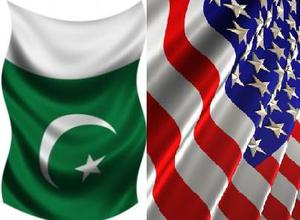Pakistan U.S. lawmakers want reconsideration of massive aid to Pakistan
U.S. lawmakers and policy makers are expressing growing exasperation with Pakistan over its attitude toward Islamic terrorism; Rep. Ted Poe (R-Texas) plans to introduce legislation this week to freeze U.S. aid to Pakistan “unless the State Department can certify to Congress that Pakistan was not harboring America’s number one enemy”; Senator Frank Lautenberg (D-New Jersey) similarly called for more information on what Pakistan knew before they can receive the $3 billion in foreign aid requested for Pakistan in 2012, and potentially more in additional military funding; John Brennan, President Obama’s counterterrorism advisor, said it is “inconceivable” to think bin Laden did not have a support system

OBL sheltering in Pakistan jeopardized U.S. aid // Source: topnews.in
With the exception of a few golden months in the immediate aftermath of the 9/11 attacks, and during the U.S. war in Afghanistan in fall 2001 and for a couple of months after that, U.S.-Pakistani cooperation in fighting terrorism was, at best, spotty.
There are three reasons for this.
- First, Pakistan views India as its main enemy, not radical Islam. India is a much larger and more populous country than Pakistan, so Pakistan feels it needs every little bit of help to balance India’s military and economic superiority. Radical Islamic movements offers Pakistan that extra help.
- Second, these groups are willing to do Pakistan’s bidding in its conflict with India not only because Pakistan is a Muslim country, but because these groups have a specific list of grievances — such as the issue of who will control Kashmir — which dovetails nicely with Pakistan’s strategic preferences.
- This is also apparent in Afghanistan. Pakistan sees Afghanistan as a country offering it — Pakistan — a measure of strategic depth. At the very least, Pakistan does not want a regime to come to power in Afghanistan which will be sympathetic to India and thus not only deny Pakistan depth, but would also lead to its encirclement. The Taliban are Pakistan’s preferred rulers of Afghanistan.
- Third, Pakistan is not a cohesive nation-state in the Western mode. It is rather an uneasy coalition of different ethnic groups and centers of power. It may well be the case that there are many pro-Western elements in the Pakistani ruling circles, but they are balance by many elements who are sympathetic to the Islamic cause and who regard anti-Western terrorism as an unfortunate and incidental aspect of an Islamic movement the activities of which are beneficial to Pakistan.
U.S. policies toward Pakistan always had to negotiate these Pakistani realities, but the effort has become increasingly more difficult sine 9/11.
The difficulty in dealing with Pakistan was captured by John Brennan, President Obama’s counterterrorism advisor, who said “Pakistan has been responsible for capturing and killing more terrorists inside of Pakistan than any country, and it’s by a wide margin.”
Still, Fox News quotes him also to say that U.S. officials are studying “how he was able to hold out there for so long, and whether or not there was any type of support system within Pakistan.” Brennan said it is “inconceivable” to think bin Laden did not have a support system.
The fact that Osama bin Laden was living comfortably, for five years, only a few miles from the Pakistani capital has caused many American lawmakers and policymakers to lose their patience with Pakistan.
CIA director Leon Panetta said in an interview with Time that it was decided that “any effort to work with the Pakistanis could jeopardize the mission” because they “might alert the targets.”
Fox News reports that after bin Laden was killed, Senator Bob Corker (R-Tennessee) sent a letter to Secretary of State Hillary Clinton requesting details on the “extent of the cooperation” from the Pakistanis. He questioned how the terror mastermind hid in such a relatively prominent location.
“The discovery that bin Laden was living in comfortable surroundings merely 35 miles from Islamabad calls into question whether or not the Pakistanis had knowledge that he was there and did not share that knowledge. The claim had been he was difficult to find because he was hiding in the mountains,” he wrote.
Fox News also notes that Rep. Ted Poe (R-Texas) plans to introduce legislation this week to freeze U.S. aid to Pakistan “unless the State Department can certify to Congress that Pakistan was not harboring America’s number one enemy.”
Senator Frank Lautenberg (D-New Jersey) similarly called for more information on what Pakistan knew before they can receive the $3 billion in foreign aid requested for Pakistan in 2012, and potentially more in additional military funding.
